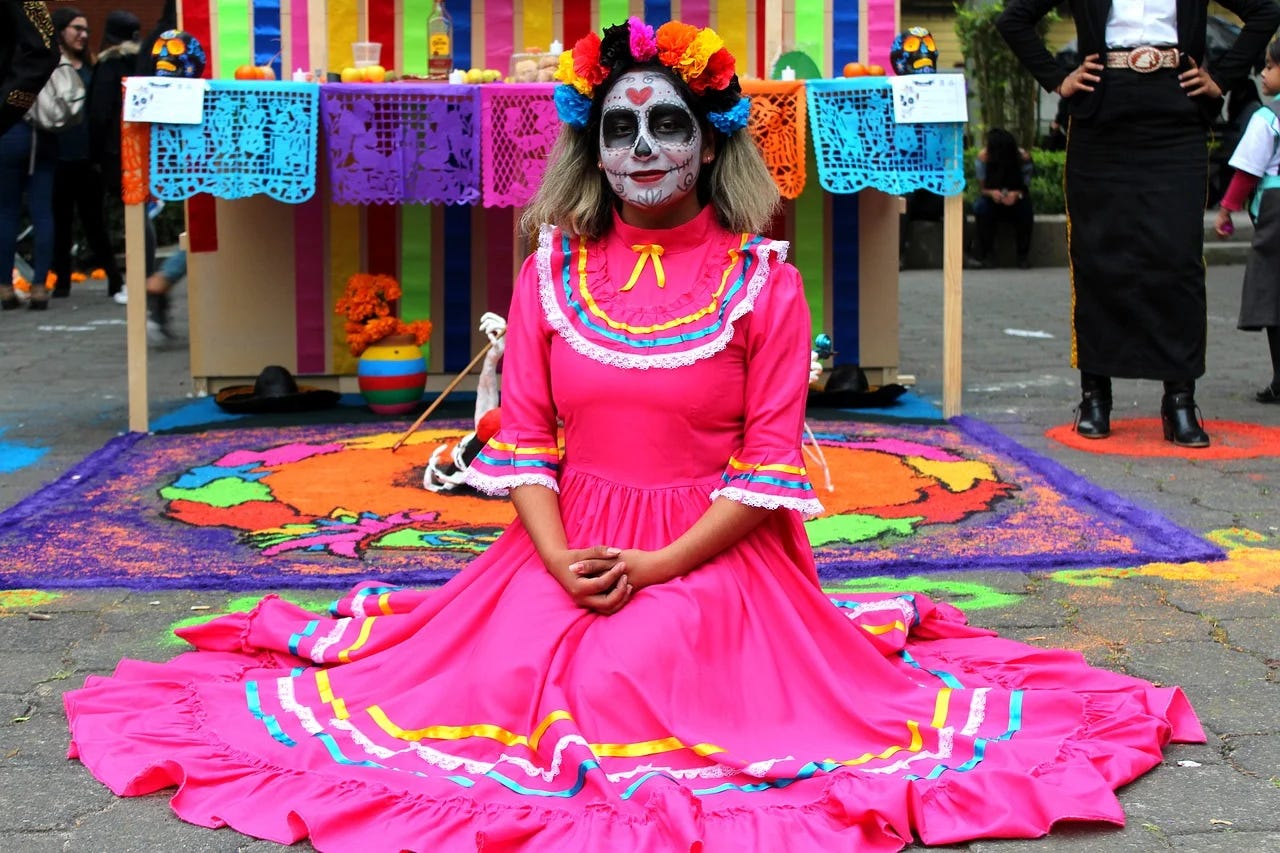The Colors of Change.
In the Library read up on Latinx Designers and the many contexts behind Wearing Colors in Fashion; Revisiting Vintage Black Canada; We want to hear from you...
This week at the Database…
Hi everyone!
I am so thankful that The Fashion and Race Database has sustained itself (thanks to you!) so that we can ring in another fall season. This is significant because it means that we are welcoming a NEW cohort of research assistants! With each year that we can welcome new research assistants, we can welcome fresh perspectives and a diverse range of lived experiences. Last month, our beloved Research Assistant Kai Marcel retired from their role, moving on to The Metropolitan Museum of Art’s Costume Institute. In the year that Kai was with us, they brought thought-provoking content and played a critical role in expanding our research on fashion and race. I invite you to review Kai’s incredible body of work with us here.
As the new season brings change here at the database, please meet Alliya Lopez and Gillani Peets:
Alliya Lopez is an MA Fashion candidate at the Creative School at Ryerson University, and she received her B.F.A. in Visual Studies from the University of Calgary. Her interests include diversity and representation in fashion, especially the colorism that takes place in the beauty industry. Born in the Philippines, Alliya has witnessed the prominence of skin whitening practices in Asian communities, and she is passionate about dissecting and analyzing their effects in her research.
Gillani Peets is a multi-media journalism student at Eugene Lang College of Liberal Arts at The New School. His areas of research include Afro-Diaspora history, cultural studies, film studies, and queer activism. Through storytelling and social commentary, Gillani hopes to bring a new perspective to fashion history.
If you’d like to put a face to a name, visit our Project Team page. Welcome, Alliya and Gillani!
– Kim Jenkins, Founder
From the Library
Latinx Designers

This reading list focuses on Latin American and Latinx designers, whose work has become widely known in the global fashion industry with their fresh looks, inspired by the aesthetic wealth of Latin America. From abroad, the work of Latin American fashion designers is still perceived as stereotypically “Latinx,” even though they have their own explorations and preoccupations, shaped by their experiences in the contexts in which they create. Moreover, and despite the increasing engagement of designers with the rich textile heritage of the region, the Latin American fashion industry is much less diverse than it appears.
– Laura Beltrán-Rubio, Researcher
Wearing Colors in Fashion
This week’s reading list focuses on the significance of wearing colors in fashion. Just as certain patterns in clothing can be traditional, colors can have social and cultural implications too. What may just seem like a simple aesthetic choice by wearing colors could actually be a deliberate choice to represent oneself. The color black, for example, encapsulates New Zealand's patriotism, as the color is very pervasive in the nation. On the other hand, in most regions in Latin America, the color black is culturally associated with grief and mourning, and is rarely worn casually because of this. These five sources provide insight into different perspectives on how one’s cultural values can shape what they wear, and how sometimes, specific colors or groupings of certain colors may have hidden meanings.
– Alliya Lopez, Assistant Researcher
‘The Library’ and the ‘Reading List’ is where we collect and organize countless educational sources all in one place. Referenced by educators, students, fashion enthusiasts and curious minds, this multi-faceted repository provides an expanding selection of tools for learning about all matters connected to fashion, appearance, power and the impact of ‘race.’
Our Fashion History
Vintage Black Canada
As difficult as it may be, if we look past Errol’s flawless ensemble [...] what remains is arguably the most important element: fearlessness [...] this photo captures Errol at the pinnacle of Black Pop Canadiana, no small feat considering that prior to himself and his contemporaries, that platform simply did not exist.
– Aaron Francis, Guest Contributor
'Our Fashion History' shares stories from contributors' photo albums in effort to expand the narrative and visual landscape of fashion history.
Let’s play 16 questions…
The Fashion and Race Database was established as a space to expand the narrative of fashion history and challenge misrepresentation within the fashion system. So many of you have found great value in everything that FRD produces - Objects That Matter, Profiles, Essays, In the News, Our Fashion History, The Directory, The Calendar, our social media platforms — and of course, the ever-expanding first-of-its-kind Library!
As FRD looks to grow and expand our operations, we want to hear from YOU - our community - to see how we can better serve you and make The Database an even more effective learning platform. Visit the link below to take a short 4-minute survey and let us know how you feel about FRD!
The Calendar
Panel: “Copycat Culture: The Copying of BIPOC Creations and Fashion Law” (October 8)
Kenya Wiley, Policy Counsel and Professor, Georgetown University and the Fashion Law Institute at Fordham Law School
Angie Byun, CEO, AB WORLD
Marcela Bolland González, Partner, Uhthoff, Gómez Vega & Uhthoff Sc
Susan Scafidi, Founder & Director, Fashion Law Institute, Fordham University School of Law (Moderator)
The Copycat Culture: The Copying of BIPOC Creations and Fashion Law panel will focus on fashion and social justice, specifically relating to fashion brands appropriating other culture’s traditions or dress. Some fashion brands have come under fire for launching clothing and accessories lines that have copied other culture’s products. The discussion will center around who really owns these art forms and the protection of these art forms by intellectual property law. Panelists will also discuss how the existing legal framework affects marginalized communities.
This panel is part of the The 29th Annual IPLJ Symposium, “IP Interrupted: Diverse Voices in Intellectual Property”at Fordham University.
Visit the event page on our site for details.
That’s it for now. Please stay safe and we’ll see you next week.
Yours in service and solidarity,
The Fashion and Race Database Team
Laura Beltrán-Rubio, Researcher
Alliya Lopez, Assistant Researcher
Gillani Peets, Research & Editorial Intern
Kendall Laws, Project Manager
Daniela Hernandez, Media Editor
Anthony Palliparambil, Jr., Content Editor
Kimberly Jenkins, Founder







